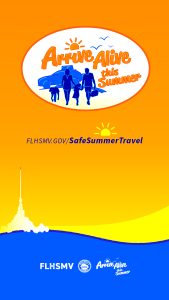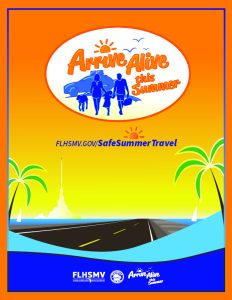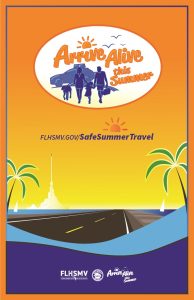Driving Safety
Safe Summer Travel

Traveling throughout Florida can be just as fun as getting to your destination. During the holiday and vacation seasons, Florida’s roads can be some of the busiest in the country. The Florida Department of Highway Safety and Motor Vehicles (FLHSMV) is committed to the safety of all motorists on our roads, educating everyone on safe driving practices to always Arrive Alive.
Speeding – Slow Down, Stay Cool
- As a motorist, it’s your responsibility to know and obey the speed limit on each road you travel.
- Speed limits are in place to keep you and those around you safe. Together, we can create a safer summer for all by slowing down and staying cool on the road.
- In Florida, the speed limit will never be higher than 70 mph on highways. Slow down – no excuses.
- Speeding is against the law and extremely dangerous. Obeying speed limits improves safety by reducing the probability and severity of crashes.
Tire Safety and Vehicle Preparation – Road Ready Vehicle
- Tires are your vehicle’s first line of defense – worn, damaged, or improperly inflated tires can cause crashes.
- According to the National Highway Traffic Safety Administration (NHTSA), drivers in the United States put more than 2,900 billion miles on their tires each year.
- To ensure everyone’s safety this summer, regularly inspect and maintain your tires.
- Pump it up this summer – literally. Under inflated tires can overheat and endanger lives. Refer to your vehicle’s owner manual for the recommended tire pressure.
- Sun damage and age can cause headlights to yellow and become cloudy. Cloudy headlights can limit your ability to see and be seen on the road. If you have an older vehicle, consider changing the headlight casing or use restorative cleaners to improve visibility.
- Properly functioning windshield wipers play a major role in safe driving in inclement weather. Hot, sunny climates like Florida can cause windshield wipers to deteriorate faster and need more frequent replacement. Periodically check windshield wipers and replace as necessary. Noisy or streaky wipers indicate its past time for replacement.
Buckle Up
- The Dori Slosberg and Katie Marchetti Safety Belt Law, effective June 30, 2009, requires that all drivers, all front seat passengers and all passengers under the age of 18, fasten their safety belts.
- Passengers 18 years or older will be charged with a violation if they fail to wear a seat belt when required by law. Drivers will be charged with a seat belt violation if any passenger under the age of 18 is not restrained with a seat belt or child restraint device.
- Seat belts save lives, but only if worn correctly every That click reduces the risk of being injured or killed in a crash by almost 50 percent.
- Wear your lap belt around your hips and wear your shoulder belt across your chest. The seat belt will not work if it is tucked behind you. Airbags are no substitute for seat belts.
- Don’t start your summer road trip without first making sure everyone is buckled properly.
Vehicular Heatstroke Prevention – Look Before You Lock
- Never leave children, vulnerable adults, or pets unattended in a vehicle – even for a short period of time.
- The inside of a vehicle can heat up by 20 degrees in just 10 minutes. A child’s body temperature can rise three to five times faster than an adult’s and heatstroke in a closed vehicle can occur when the temperature is as low as 57 degrees outside.
- If you see a child, vulnerable adult, or pet locked in a hot car, take immediate action by calling 911.
- Always check the back seat before leaving and locking your vehicle.
- Florida law states that “a parent, legal guardian, or other person responsible for a child younger than 6 years of age must not leave the child unattended or unsupervised in a motor vehicle for a period in excess of 15 minutes” or “for any period of time if the motor of the vehicle is running, the health of the child is in danger, or the child appears to be in distress.”
- A violation of this law is a second-degree misdemeanor and can result in a fine of up to $500. Violations that cause great bodily harm, permanent disability or permanent disfigurement to a child are considered a third-degree felony.
- Florida law, section 768.139, Florida Statutes, provides for the rescue of a vulnerable person or domestic animal from a motor vehicle. These good Samaritans may have immunity for damage to the motor vehicle if:
- The vehicle is locked and there is no other reasonable way the person or animal to get out.
- Has reasonable belief based upon the circumstances that entry is necessary because the person or animal is in imminent danger.
- Notifies law enforcement or calls 911 prior to or immediately after entering the vehicle.
- Uses no more force than is necessary; and
- Remains with the person or animal until law enforcement or other first responder arrives.
For more information, please visit the Florida Department of Children and Families (DCF) website.
Impaired Driving Prevention
- Under Florida law, DUI is one offense, proved by impairment of normal faculties by any substance or unlawful blood alcohol or breath alcohol level of .08 or above.
- If you see an impaired driver on the road, do not hesitate to contact law enforcement or dial *FHP (*347). This call could save a life.
- Plan ahead, designate a driver or call a ride service.
- Driving impaired not only puts everyone on the roadway in danger, it can have serious legal and monetary consequences. Penalties for DUIs include expensive fines, license revocation and jail time. Convictions can remain on your record for 75 years.
Driving in Inclement Weather
- Driving in severe weather conditions can significantly increase the potential for a dangerous situation. Sometimes the best decision drivers can make is to stay put until the storm passes. If driving is the only option, buckle up, and follow these rules to ensure safety:
- TURN LIGHTS AND WIPERS ON. Florida law requires that if a vehicle’s wipers are in use, headlights must be on. To ensure high visibility, headlights should be clean and clear, and wipers should be replaced at least once a year.
- SLOW DOWN. Keep a safe stopping distance between vehicles and avoid passing and/or changing lanes. Wet pavement can result in skidding and hydroplaning. Be patient and stay alert. Use the right edge of the road or painted road markings as a guide.
- TURN AROUND; DON’T DROWN. Never drive through flooded areas. The area of roadway beneath the water may be washed out or may conceal debris or even power lines.
- BE CAUTIOUS OF HIGH WINDS. Windy conditions are a driving risk to all vehicles, particularly high-profile vehicles such as buses and trucks. Use extra caution around vehicles carrying cargo. Strong wind can occur anywhere, but it can be more common in wide open spaces, including bridges and highway overpasses. Keep a firm grip on the steering wheel and give large vehicles extra room to maneuver.
- BE PREPARED FOR INOPERABLE TRAFFIC LIGHTS. Traffic lights are designed to keep traffic moving and prevent collisions; however, non-working or missing lights can be a source of confusion for drivers. If a law enforcement officer is present, follow their directions. Otherwise, treat the intersection as if it were a four-way stop sign. If traffic lights are flashing red, come to a complete stop and treat the intersection as a four-way stop. If lights are flashing yellow, proceed with caution and be prepared to yield to oncoming traffic.
- Links to: Florida 511 Map, FHP Live Traffic Crash & Road Condition Report
Traveling with your Pet
- If you’re in a crash, any passenger, including an animal in the vehicle, could be injured. When bringing your cat or dog on vacation, consider these tips for a safe, pet-friendly road trip.
- Hot Car Precautions-On a warm day, temperatures inside a vehicle can rise rapidly to dangerous levels. On an 85-degree day, for example, the temperature inside a car with the windows opened slightly can reach 102 degrees within 10 minutes. After 30 minutes, the temperature will reach 120 degrees. Your pet may suffer irreversible organ damage or die.
- Car Safety Equipment- In a crash, you’ll want to know your pet is secure in a carrier or safety harness to restrict them from harmful movement. Ensure the carrier is large enough for your dog to stand, turn around, and lie down. See how to fit a harness for your dog here.
- Never put your pet in the front seat of a vehicle — even in a crate — as they could be seriously injured by an air bag during a crash.
- Unrestrained pets can distract the driver; it only takes a momentary lapse of concentration for your safety to be jeopardized.
- It is not recommended to let your dog ride in a car with their head out of the window. Doing so can put your pet at risk of being hit by passing debris, thrown out of the car in the event of a collision, or injured if you have to suddenly brake or turn.
- According to a Kurgo/AAA survey:
- Nearly six in 10 (56%) people have driven with their dog in a vehicle at least once a month over the past year.
- Three in 10 people (29%) admit to being distracted by their dog while driving.
- Sixty-five percent of dog owners admit to engaging in at least one potentially distracting activity while driving with their dog.
- Activities engaged in while driving with dogs by survey respondents include:
- Petting their dog (52%)
- Using hands or arms to restrict dog’s movement or hold dog in place when putting on brakes (23%)
- Using hands/arms to keep dog from climbing from the backseat to the front seat (19%)
- Reaching into backseat to interact with dog (18%)
- Allowing dog to sit in lap or holding dog while driving (17%)
- Giving food or treats to dog (13%)
- Playing with dog (4%)
- Taking a photo of dog (3%)
- An unrestrained 10-pound dog in a crash at 50 mph will exert roughly 500 pounds of force, while an unrestrained 80-pound dog in a crash at only 30 mph will exert approximately 2400 pounds of force.
- According to a Kurgo/AAA survey:
- Pet Friendly Rest Stops. Plan your route in advance and ensure that there are pet friendly rest areas along the way.

Campaign Resources
Social Media Kit

1080 x 1080
Print Media Kit




Dave Kerner, Executive Director